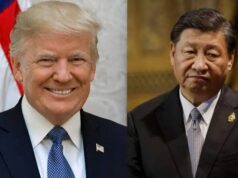Hong Kong activist Agnes Chow recalls terrifying time in China before fleeing

Agnes Chow speaks in an online interview with Kyodo News on Dec. 6, 2023
Prominent pro-democracy activist Agnes Chow, who recently revealed that she had left Hong Kong to study in Canada with no plans to return, recalled in an online interview on Wednesday that agreeing to spend time in mainland China before her departure overseas was a high-stakes decision for her.
“It was a gamble (for me) in order to go to Canada. I was scared,” the 27-year-old said, speaking of her experience of staying in mainland China as a condition imposed by the Hong Kong police for studying overseas.
Two years after her release from a Hong Kong prison where she served time for inciting an unauthorized protest in 2019, Chow announced Sunday through Instagram that she began her studies in Toronto in September and will likely never return home out of concerns for her own safety and mental health.
She also claimed she had been taken to mainland China and asked to pen letters of repentance by Hong Kong’s national security police in exchange for her passport, which had been confiscated upon her arrest in 2020.
Her trip to the mainland included visits to patriotic exhibitions and the headquarters of Chinese tech giant Tencent Holdings Ltd.
In the interview with Kyodo News, Chow said she felt that she had no say in the matter. “I thought that if I refused, I wouldn’t be able to go to Canada, and I might be arrested.”
“If something were to happen in China, I was not sure if I could even return to Hong Kong. I was worried,” she also said.
Following her arrest in 2020, Chow said that she has suffered from depression and other metal disorders, which deeply affected her daily life.
“There was a three-year period where I couldn’t do anything,” she recalled. “I couldn’t go outside, couldn’t eat and couldn’t sleep…I was so distraught.”
There were also times when she cried and yelled, after seeing news of the arrest of pro-democracy figures, she said.
Chow was convicted alongside fellow activists Joshua Wong and Ivan Lam over their involvement in the pro-democracy protest on June 21, 2019, in which mostly young protesters besieged the city’s police headquarters.
Since then, she has had no contact with any of her fellow activists, fearing that it could lead to negative consequences for either party.
“We were self-policing because we could be arrested at any time,” she said. “I was afraid to contact people who had been active — if it was discovered that we were in contact with each other…it could be dangerous.”
The protest occurred amid an intensifying anti-government movement that was spurred by a surge in opposition to the Hong Kong government’s now-withdrawn plan to allow suspects to be sent to mainland China for trial.
Chow lamented the current situation of Hong Kong, under which she believes citizens have been stripped of their right to choose, as Beijing continues to tighten its grip in the aftermath of the 2019 anti-government protests, including through electoral changes.
In July, Hong Kong’s legislature unanimously approved an electoral overhaul dictating that only “patriots” could be elected to the city’s district councils.
“The changes have rendered it impossible for anyone outside of China-approved parties to run for the elections,” she said. “The government says we have one country, two systems, but universal democratic elections, freedom of speech and the rule of law are no longer there.”
Chow was one of the leaders of the 2014 Umbrella Movement that called for democratic change in the former British colony. Between 2019 and 2020, she, along with Wong and other members of advocacy group Demosisto, worked to bring international attention to the city’s pro-democracy movement.
Her fluent, self-taught Japanese language skills and activism via social media have helped her become popular in Japan, where some media have dubbed her the “Goddess of Democracy,” leading to speculation as to why she did not elect to move there instead.
But according to Chow, her decision to move to Canada was not a political one, but one based on a desire to pursue further studies in an English-speaking country.
Despite having only been in Toronto for three months, she has already felt a palpable change in the quality of her life.
“The biggest difference is knowing that Canada is a democratic country where freedom is guaranteed…that the national security police aren’t here.”
While she has yet to set concrete plans for the future, Chow said that over the past three years, she has come to realize just how important it is to be able to live a life without fear, adding that that, in itself, is enough.
“I want to live freely,” she said. “To be able to do what I want and say what I want…wouldn’t that be nice?”




